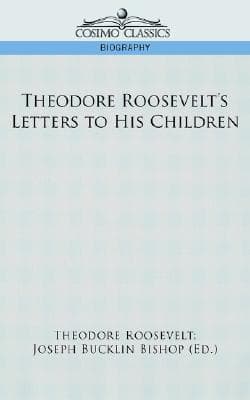
Book Review Summary: Theodore Roosevelt's Letters to His Children
Introduction
"Theodore Roosevelt's Letters to His Children" is a captivating collection of letters written by the 26th President of the United States, Theodore Roosevelt, to his children and other correspondents about his children. Roosevelt, also known as T.R. and Teddy, was not only a political leader and explorer but also a devoted father who cherished his family life. This book offers a unique glimpse into the heart of a great man, revealing his tenderness, playfulness, and love for his children. It provides a cozy and intimate portrait of one of the most influential American presidents.
About Theodore Roosevelt
Theodore Roosevelt, Jr., better known as T.R. or Teddy, was a multifaceted individual who served as the 26th President of the United States from 1901 to 1909. He was a prolific writer, historian, naturalist, explorer, and soldier. Roosevelt's expansive personality, grand sense of adventure, and love for his family made him a beloved figure in American history. As a father, he was deeply in love with his children and took great joy in their company. His letters to his children offer a rare insight into his life as a parent and provide a fascinating perspective on his character.
Analysis of Views
-
Personal and Intimate Glimpse: Readers appreciate the personal nature of the letters, which offer a candid and intimate look into Roosevelt's life as a father. The letters reveal his playfulness, tenderness, and genuine interest in his children's lives. They find it captivating to see Roosevelt interacting with his kids as friends, confidantes, and equals.
-
Historical Significance: The letters contain historical insights that reflect Roosevelt's open-mindedness and curiosity. They provide valuable information about his observations during the surveying of the Panama Canal and his travels in the Caribbean as President. These historical elements enhance the book's appeal and showcase Roosevelt's broad range of interests and achievements.
-
Warm and Encouraging: Readers describe the book as warm and encouraging, highlighting Roosevelt's unwavering support for his children. He constantly encourages them to be their best selves and expresses his respect and admiration for them. This aspect of the book resonates with readers who value strong family relationships and positive role models.
-
Adventurous and Entertaining: The book's adventurous elements, including presidential trips and hunting expeditions, add excitement and entertainment to the reading experience. Readers enjoy learning about Roosevelt's escapades and appreciate the glimpses into his life beyond his political career. These elements make the book engaging and entertaining for both history enthusiasts and general readers.
-
Inspirational Fatherhood: Many readers find inspiration in Roosevelt's approach to fatherhood. He prioritizes his family life, maintains close friendships with his children, and treats them as companions rather than simply authority figures. His dedication to nurturing their growth and development serves as an example of what a healthy father-child relationship should look like.
Reasons for Recommendation
-
Intimate Portrait: The book offers an intimate portrait of Theodore Roosevelt as a father, revealing his love for his children and his commitment to their well-being. It provides readers with a unique glimpse into the personal side of one of the most influential American presidents.
-
Historical Significance: The letters contain historical insights into Roosevelt's life, including his observations during significant events such as the Panama Canal surveying and Caribbean travels. This historical context adds depth to the book and enriches readers' understanding of Roosevelt's legacy.
-
Warm and Encouraging: The letters convey warmth and encouragement, showcasing Roosevelt's unwavering support for his children. Readers appreciate the positive messages he sends and find inspiration in his approach to parenting. This aspect of the book resonates with readers who value strong family relationships and positive role models.
Reasons for Not Recommendation
-
Lack of Historical Context: Some readers feel that the book lacks historical context, making it difficult to fully appreciate the significance of certain events mentioned in the letters. They believe that additional historical background would have enhanced their understanding of Roosevelt's life and actions.
-
Overemphasis on Personal Life: A few readers feel that the book places too much emphasis on Roosevelt's personal life, including his letters about pets, playtime, and domestic activities. They believe that this focus detracts from the historical significance of Roosevelt's presidency and limits the book's appeal to those primarily interested in his political career.
Conclusion
"Theodore Roosevelt's Letters to His Children" is a captivating collection of letters that offers readers an intimate glimpse into the heart of one of America's most beloved presidents. Through these letters, we see Roosevelt as a devoted father who cherished his family life, showering his children with love, encouragement, and support. The historical insights provided by these letters add depth to our understanding of Roosevelt's legacy, while his warmth and playfulness make this book an enjoyable read for both history enthusiasts and general readers alike. While some readers may find it lacking in historical context or overemphasize personal aspects, overall, "Theodore Roosevelt's Letters to His Children" is highly recommended for those seeking a personal connection with this iconic figure through the lens of fatherhood and family life.